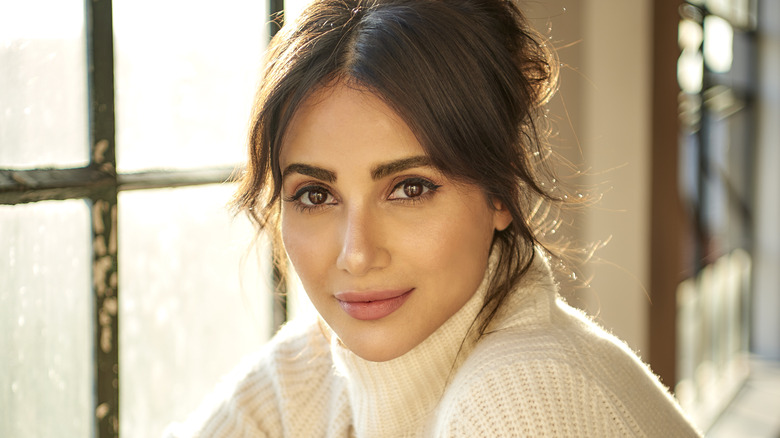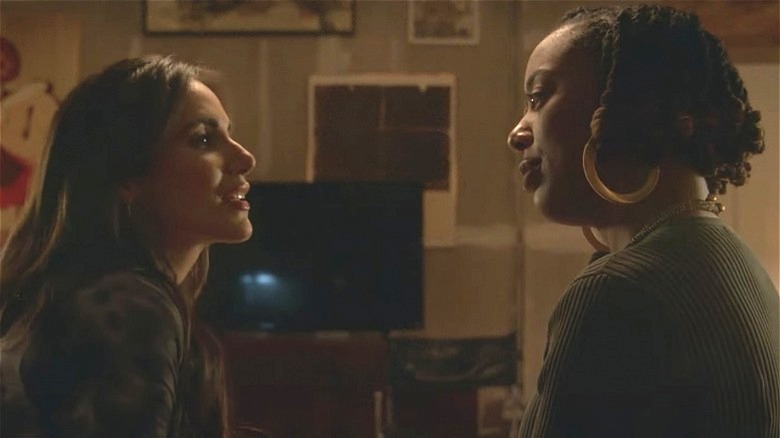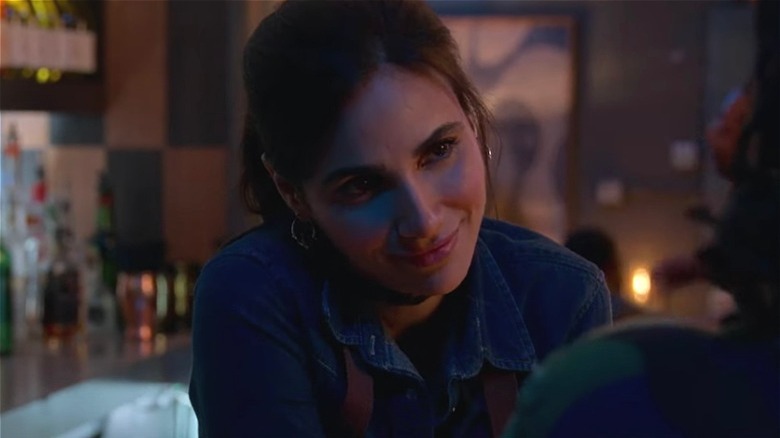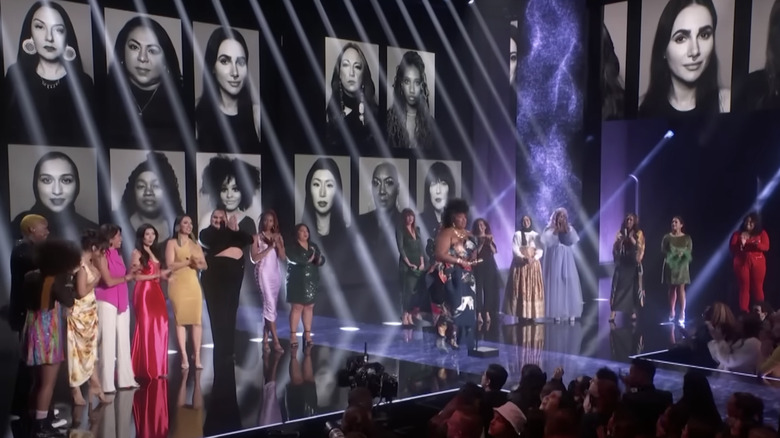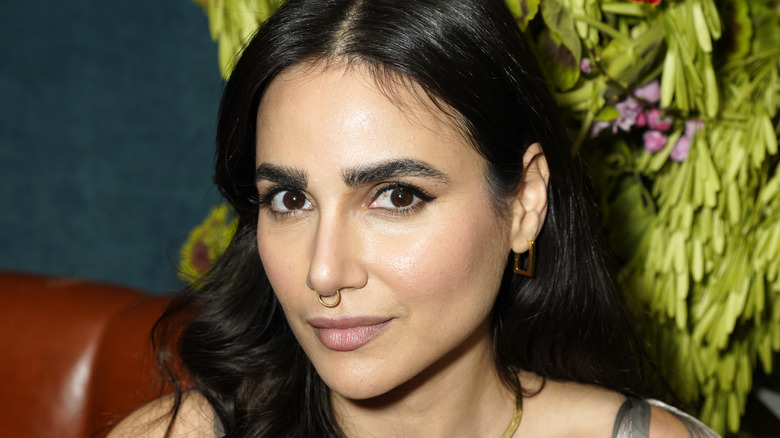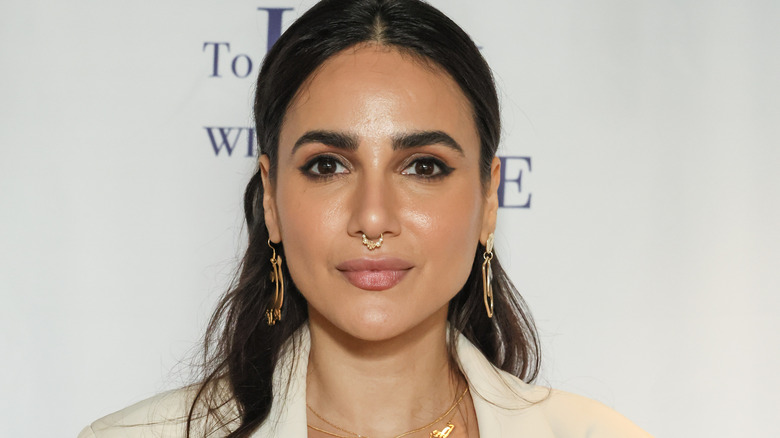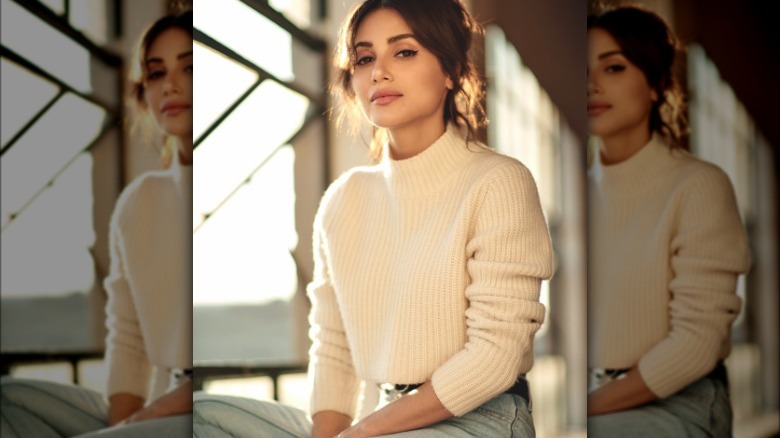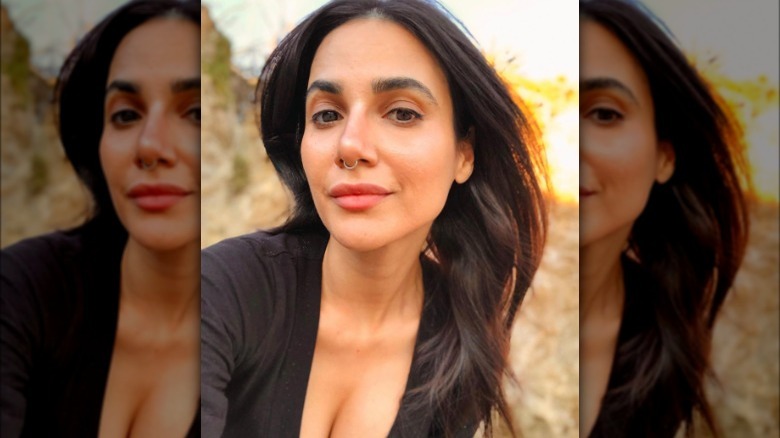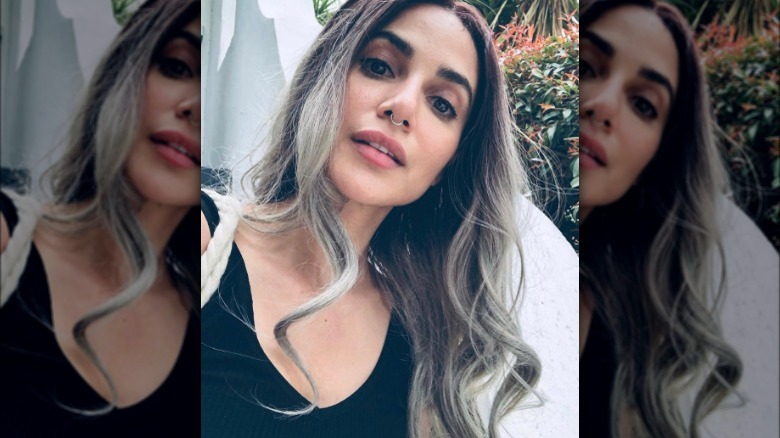Yasmine Aker On Good Trouble Season 5 & What's Next For Angelica - Exclusive Interview
Yasmine Aker can currently be seen on "Good Trouble" playing queer waitress Angelica. In Season 5, Aker's character finds herself caught up in a twisty love triangle, and in true "Good Trouble" fashion, many surprises and unexpected plot twists await viewers. When she's not appearing on one of Freeform's hottest shows, Aker is extremely busy with a plethora of different projects, including her crucial advocacy work as an Iranian American and utilizing her online following to speak directly to her fans.
In 2022, Aker's tireless work as an activist was recognized by Lizzo at the People's Choice Awards, where she joined 17 other advocates on stage alongside the pop superstar. She has also branched out into directing, completing a poignant short film about her lived experience as an Iranian American. The List caught up with Aker to talk "Good Trouble" Season 5, meeting Lizzo, standing up for Iranians, and who she'd love to work with next.
Joining Good Trouble as Angelica
What can fans expect from Angelica in new episodes of "Good Trouble"?
I'm not supposed to divulge anything, but in "Good Trouble" fashion, people keep circling back to friendships. It's a very real show that reflects a lot of realistic ways that people actually relate with one another. It's a very complicated relationship that Angelica, Malika, and Angelica's ex have in this strange triangle of work-love-exes. There is definitely a lot of navigating transitions of relationships [and] trying to keep relationships within a healthy place.
With "Good Trouble," you never know what's going to happen. The writers keep everyone on their toes, us included. Things shift and change, and there's a lot of different characters and people going through a lot of different human experiences. There's definitely a lot to stay glued to. There's a lot that is even more interesting this season than in prior seasons that have come and gone because it keeps getting more intense.
You took over this role from Odelya Halevi and made it your own. What was it like joining "Good Trouble"? Were you already a fan of the show?
I did come on board after my dear friend, Odelya Halevi, played Angelica prior to me. Right off the bat, I was a little nervous because I thought, "I have to fill her shoes. I have to create a character that is a carbon copy of what she has done." But the executive producers and the directors, everyone has been so sweet — they're like, "No, no, no, there's no pressure to do that. Make her your own. This is your version of Angelica." The cast and crew of "Good Trouble" are so welcoming, inclusive, and lovely that the transition of taking over the role of Angelica couldn't have been more easy. It was a very smooth transition.
I had not been watching the show prior to getting the show, but I had started watching the show because I had to catch up fast. As things were happening before we started shooting, I was watching episode after episode after episode trying to catch up. I'm surprised that I hadn't watched it before, but in the world of television we live in right now, there's so many shows out there that I had not gotten to this show. Once I started watching, I was like, "This is a really good show." To feel like, "Wow, I'm a moving part in this grander story of 'Good Trouble,'" it's an honor.
Looking to Angelica's future
Do you have any favorite memories from the set with the cast and crew of "Good Trouble"?
They are such a lovely group. Last season, we had that '90s party shoot, and that felt like a marathon. It felt like Halloween. It felt like karaoke. It was so much fun, but so silly and exhausting and all-encompassing. All of us were on set all of the time. We were all there. There was so much camaraderie, so many fun moments with each and every single person because we all had to be in this narrative where every character existed. Then we all had to go to the studio to record the songs and sing, so it was a very fun experience. The costumes were hilarious. That would have to be the highlight memory so far.
I know you can't tell us any secrets, but do you have any hopes for Angelica in the future?
We all hope this in our own lives, as well: I hope that there is resolution in what Angelica's character wants out of life. Angelica is very self-protective and does the right thing, even though the right thing isn't necessarily the fun thing or the thing that she would want to be experiencing. But she makes the most authentic choice for herself to stay safe and to make sure that she stays true to what she wants and [does] not compromise on that. Because she did break up with Lucia for not having time for her, she wouldn't jump right back into something like that with Malika just because Malika has either professed her love or has said that she does want to be with her. There's all these oscillations that keep happening back and forth with them.
I feel like Angelica continues to make the most mature choices, and I would love for her to be rewarded for that in life, as we all wish. We're always like, "If you do the right thing, hopefully, you get the thing that you desire; hopefully, you get the thing that you want." I hope that exists in her reality sometime in the future, but we'll see. Who knows?
On being chosen by Lizzo for the People's Choice Awards
You were selected to be part of the People's Choice Awards, when Lizzo chose 17 activists to join her on stage. What did it feel like to be chosen and take part in the event?
That was surreal, because I had no idea that she was going to have me be on that stage. It was not planned. I had no idea. My manager at the time called me and said, "Hey, Lizzo and her team have reached out and they would like for you to be on stage when she's receiving the People's Choice Award." At first, I was like, "This must be a mistake." I couldn't compute. I'm like, "Why would she choose me? I don't understand. What's this about?" [My manager explained], "It's because of your activism ... She's choosing several activists to be up there with her and you are one of them." I was floored.
To be honest with you, I didn't think it was true. I thought someone was pranking me or punking me. I said yes. I was like, "Yeah, sure. Let's do it." They're like, "Okay, these are the dates that you're going to have to get your COVID test." I'm like, "Okay, great." They're like, "Then you're going to go to the dress rehearsal." I'm like, "Sure, yeah, let's do that." I showed up at the dress rehearsal and I was like, "This is happening."
Lizzo comes out, and she's so sweet. She says hello to everyone, gives everyone hugs, and has taken the effort to learn every single person's name and what they're about and what they do. She is who she says she is. She really is this amazing human being who not only does so much for her own community, but she also has so much humility and props everyone else up who is doing great things. She's one of a kind. I've never met people like her, not in our industry where it's so much navel-gazing. She doesn't do that. She has her eyes set outward to the world and does everything that she can for women, for minorities, and for underprivileged communities. It's pretty crazy.
Have you heard from Lizzo since?
No. I had spoken to one of her reps about something that's going on with Iran, and she told us to stay in touch with her management if we needed anything. But she's Lizzo, so you don't want to be bothering her. They reached out at one point because they sent beautiful gifts and stuff to all of us. It's very minimal communication — I don't have her on my speed dial. I'm not texting.
On directing a short film about the Iranian American experience
You recently wrote and directed a short film called "Okay," which is about the life of an Iranian American woman. Why was that an important story for you to tell right now?
We shot that before the Iranian revolution took place. I'm Iranian. I'm Iranian American. I'm a woman. For me, the short film was very cathartic. It was a healing experience after my own personal divorce. It has to do with mental health and going through a divorce and learning how to stand in our power and do what's authentic for ourselves.
I had no idea that it was going to be received at a time when Iranians are in the middle of something so historic and so painful for us. I had created this film that was fully subtitled — half Farsi, half English — because I don't see a lot of this. I would like projects to be perfectly bilingual where it very smoothly moves between the two languages and the two cultures, even. That's our lived experience when we're foreigners of the Western world. We have this very complicated but simple dance between our culture and the culture that we are adopting.
About six months ago, the unfortunate events happened in Iran with Mahsa Amini, which is nothing new; women have been getting stopped, arrested, beaten, and killed in Iran. In Afghanistan, women are stoned to death for the accusation of adultery, not even proven adultery. Women around the world are treated in ways that are unimaginable. Iran and Afghanistan happen to be two of those places where that's happening right now, and it's at the forefront of one of the reasons why the revolution is happening. There's gender apartheid happening in Iran. There's gender apartheid happening in a lot of places in the Middle East, if we're very honest with ourselves. I think we are at a turning point in our world where people — not just women — are not okay with that.
On her advocacy on behalf of Iran
Aker [continued]: We're not living in the Stone Age. We're not okay with gender apartheid. We're not okay with using the excuse of religion to disempower and disenfranchise half of the population and all of the LGBTQ community and every other minority group under the guise of religion. It's actually incumbent on the person of faith, who has the most power, to say something about what's going on under your own religious umbrella. It becomes our responsibility to hold people accountable within our religious group when they use that religion in ways that are not honorable and integrous. The people in Iran are fed up [with] having to live with forced religion, with so many imprisonments and executions that are done without due process.
Imagine if your court had a priest sitting at the pulpit of the courthouse, and he hears a couple of things and makes a judgment, and that's the end of that. Not a lot of evidence is seen. Your lawyer can't be there, your family can't come to be witness — a verdict is given and you're executed within a month or two, and there's nothing anyone can do about it. They have verdicts like corruption against God. Well, you can accuse anyone of that if you can carry out an execution for it, and being homosexual is punishable by death in Iran and Afghanistan, some parts of Africa and the Sub-Saharan world, and even in the Middle East. We have quite draconian laws that have carried through from hundreds of years ago that our societies have to put to account and take a hard look at and say, "Is this the world we want to live in? Is this representative of how we have evolved and who we are now as a human species?" I think not.
The realities of being an advocate
Is it difficult being an advocate?
There comes a certain level of danger that you put yourself in, because once you're in the public eye and you speak against the Taliban or you speak against the Islamic Republic, you're speaking against these governments that do have agents around the world and do carry out assassinations from time to time. Anyone and everyone who's an activist that speaks out against governments specifically, they have a little bit of a natural fear that comes from that. You have to get real with, "Okay, if I become a target for them, what does that mean for me and my family? How do I protect myself in those circumstances?" That's something [activists] have to address and be prepared for to a certain degree.
Aside from that, you have to leave it as an afterthought. It's a reality that exists. Then you also have to say, "What are the chances? Not that high? It should be fine. I'll make sure to be careful and not have my address listed and not post about certain family members or not tell people exactly where I am." Things like that, everyone should be practicing in our new world. Everyone needs to have better internet hygiene, so to speak. As long as you stay as safe as you can, then that fear should be something that exists in the background — but not living in that fear, because that's what they hope for. They hope that most people will be so scared that they won't speak out against what's going on, because they don't want you to inconvenience yourself and have something bad happen to you.
That's what keeps people silent. That's what has kept most Iranians silent for 44 years; everyone has family back home and they don't want to endanger their family. They stay quiet for that one aunt, uncle, cousin, whomever, and they want to keep them safe. Everyone has had their reasons, but people have stayed quiet for a very long time. It's reached a tipping point where enough people are speaking out that it's quite difficult for any entity to go and find every single one of us, since there's hundreds of thousands of us now speaking out.
An ADHD diagnosis and learning to make eye contact
I was diagnosed with ADHD last year, and I know you've been open about your own diagnosis. How has your ADHD impacted your career?
I don't think that I've paid much attention to how it's affected my career. For the most part, we mask to make sure no one knows what's going on. I've been masking most of my life and trying to be as "normie" as possible in as many environments as possible so that no alarm bells go off for anyone.
One thing I have noticed that was so much more difficult for me than the regular actor — and that has to do with being on the autism spectrum — is that until I started acting, I never looked at anyone in their eyes. I never made eye contact. Never. It's just not dawned on me to look into people's eyes. I look at people's mouths, or I look around while I'm having thoughts going on in my head. Being on set and saying lines, I learned to look in people's eyes. I'm not always perfect at it, and even when it's edited and it's on TV, I catch myself where I'm like, "Oh, you're not even looking at that person's eyes." That's one observation that I've made, is that eye contact is tricky.
What's funny is I did an interview before I knew I had autism, and the interviewer said, in the middle of the interview, "Where are you looking? Is there something behind me?" I'm like, "Oh, no, I'm sorry." I didn't know how to explain it away because I didn't have my diagnosis yet. I was like, "I don't know, it's shiny." I didn't know what to say.
Dreaming of working with Will Ferrell
Are you planning to direct more films?
Yes. I would love to. I love writing. It's something that I've always done. I would love to do more directing. I'm in that space right now where I'm not very confident in my abilities, so I would want to direct short things or be able to shadow while people are directing TV shows and films. I have one of those perfectionist personality types where if I don't think that I'm going to do perfect, if I don't think that I'm going to do something well enough where I would be proud of it, I'm reluctant to take the helm and say, "Give it a go and see." But I would love to keep learning more about directing, specifically, and to have more opportunities to direct shorts.
Do you have any dream collaborators?
This is going to sound absolutely bizarre, but Will Ferrell and Molly Shannon. That would be amazing. I don't know in what capacity. I would even love to be a fly on the wall and see how they work. That would be quite a treat to be able to do that. I have so much respect for comedians, especially, because I feel like they get the depth of life and choose to be funny. They could very easily do drama, but they choose to do funny.
I have so much respect for that because life is like that. Life is this ongoing tragedy that we keep describing as funny. Then, when we watch movies that don't have any comedic breaks or moments, it feels false. I feel like even in my darkest days, I have found a way to laugh at what was going on, and I love that. I love the ability to be able to do that. That's beautiful.
Is there anything else you want our readers to know?
Just that I'm very grateful. Thank you for amplifying the voices of the women in Iran and Afghanistan. I know that there's a lot happening all around the world and we can get empathy fatigue. I'm so appreciative of anyone from anywhere around the world who puts focus and energy toward the plight of anyone in the world who is dealing with something that is difficult that requires us to advocate for them.
We live in a time that's stressful. There's climate change that's stressful, the economy is stressful, all of the natural disasters are stressful, and the rise of fascism and extremism. There's a lot of fundamentalist stuff going on all around the world, and it can't be easy. The easy thing is to shut down and disassociate and close our eyes and put our heads in the sand. I want to say thank you to everyone who has bravely decided that they won't do that.
Watch "Good Trouble" Season 5 on Freeform and Hulu.
This interview has been edited for clarity.
